Bio 1106 - Study guides, Class notes & Summaries
Looking for the best study guides, study notes and summaries about Bio 1106? On this page you'll find 42 study documents about Bio 1106.
Page 4 out of 42 results
Sort by
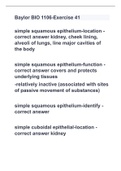
-
Baylor BIO 1106-Exercise 41 with 100% complete solutions
- Exam (elaborations) • 20 pages • 2023
- Available in package deal
-
- $16.49
- + learn more
simple squamous epithelium-location kidney, cheek lining, alveoli of lungs, line major cavities of the body simple squamous epithelium-function covers and protects underlying tissues -relatively inactive (associated with sites of passive movement of substances) 00:18 01:22 simple squamous epithelium-identify simple cuboidal epithelial-location kidney simple cuboidal epithelial-function covers and protects underlying tissues simple cuboidal epithe...
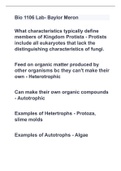
-
Bio 1106 Lab- Baylor Meron with 100% complete solutions already graded A
- Exam (elaborations) • 42 pages • 2023
- Available in package deal
-
- $15.99
- + learn more
What characteristics typically define members of Kingdom Protista Protists include all eukaryotes that lack the distinguishing characteristics of fungi. Feed on organic matter produced by other organisms bc they can't make their own Heterotrophic 00:22 01:22 Can make their own organic compounds Autotrophic Examples of Hetertrophs Protoza, slime molds Examples of Autotrophs Algae Three types of cellular organization in algae unicellular, filamen...
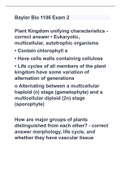
-
Baylor Bio 1106 Exam 2 2023 with 100% complete solutions already graded A
- Exam (elaborations) • 42 pages • 2023
- Available in package deal
-
- $15.99
- + learn more
Plant Kingdom unifying characteristics • Eukaryotic, multicellular, autotrophic organisms • Contain chlorophyll a • Have cells walls containing cellulose • Life cycles of all members of the plant kingdom have some variation of alternation of generations o Alternating between a multicellular haploid (n) stage (gametophyte) and a multicellular diploid (2n) stage (sporophyte) How are major groups of plants distinguished from each other? morphology, life cycle, and whether they ...
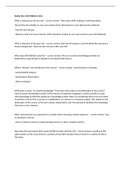
-
Baylor Bio 1106 Midterm 2021 with 100% complete solutions
- Exam (elaborations) • 9 pages • 2023
- Available in package deal
-
- $16.49
- + learn more
What is expected of the pre-lab? -Take notes while reading or watching videos. -Record the lab activities in your own words and/or illustrations in your physical lab notebook. -Take the pre-lab quiz. -Upload a picture of your protocol, which should be written in your own words in your Lab Notebook. What is expected of the post lab? Each lab will require a Lab Notebook-like entryinto a Canvas Assignment. These are due 24 hours after your lab. 00:02 01:22 What does BIO...
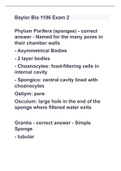
-
Baylor Bio 1106 Exam 2 with 100% complete solutions
- Exam (elaborations) • 4 pages • 2023
- Available in package deal
-
- $14.99
- + learn more
Phylum Porifera (sponges) - Named for the many pores in their chamber walls - Asymmetrical Bodies - 2 layer bodies - Choanocytes: food-filtering cells in internal cavity - Spongico: central cavity lined with choanocytes Ostiym: pore Osculum: large hole in the end of the sponge where filtered water exits Grantia - Simple Sponge - tubular - filter-feeding heterotrophs - Digestion is intracellular 00:03 01:22 Eplectella Ornate Lattice Structure Complicated white...
All you need to know about levels of biology, core concepts of biology, classification of living things, and biology as a scientific discipline
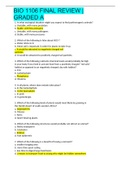
-
BIO 1106 FINAL REVIEW | GRADED A
- Exam (elaborations) • 17 pages • 2021
-
- $13.00
- + learn more
1. In what ecological situation might you expect to find parthenogenic animals? a. Unstable, with many predators b. Stable, with few pressures c. Unstable, with many pathogens d. Stable, with many pressures 2. Which of the following is false about NO3-? a. Water sticks to it. b. Moist soil is important in order for plants to take it up. c. It would be attracted to negatively charged soil particles. d. It would be attracted to positively charged soil particles. 3. Which of the follow...
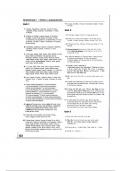
-
English for computer users-cambridge university
- Class notes • 9 pages • 2023
-
- $27.99
- + learn more
Welcome to my Stuvia store! I am excited to share a collection of English documents tailored for computer users at Cambridge University. Whether you're looking to enhance your language skills for academic or professional purposes, my carefully curated materials will provide valuable insights and practical knowledge. From technical writing to communication in the digital age, these documents are designed to support your learning journey
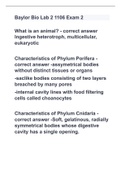
-
Baylor Bio Lab 2 1106 Exam 2 with 100% complete solutions
- Exam (elaborations) • 19 pages • 2023
-
- $12.99
- + learn more
What is an animal? Ingestive heterotroph, multicellular, eukaryotic Characteristics of Phylum Porifera -assymetrical bodies without distinct tissues or organs -saclike bodies consisting of two layers breached by many pores -internal cavity lines with food filtering cells called choanocytes 01:07 01:22 Characteristics of Phylum Cnidaria -Soft, gelatinous, radially symmetrical bodies whose digestive cavity has a single opening. -possesses tentacles armed with stinging...
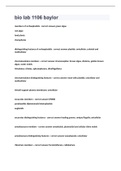
-
bio lab 1106 baylor with 100% complete solutions
- Exam (elaborations) • 2 pages • 2023
-
- $13.99
- + learn more
members of archaeplastids green algae red algae land plants charophytes distinguishing features of archaeplastids plastids: unicellular, colonial and multicellular 00:28 01:22 chromalveolates members stramenopiles: brown algae, diatoms, golden brown algae, water molds Alveolates: ciliates, aplcomplexans, dinoflagellates chromalveolates distinguishing features most with plastids; unicellular and multicellular Alveoli support plasma membrane; unicellular ...

Did you know that on average a seller on Stuvia earns $82 per month selling study resources? Hmm, hint, hint. Discover all about earning on Stuvia



